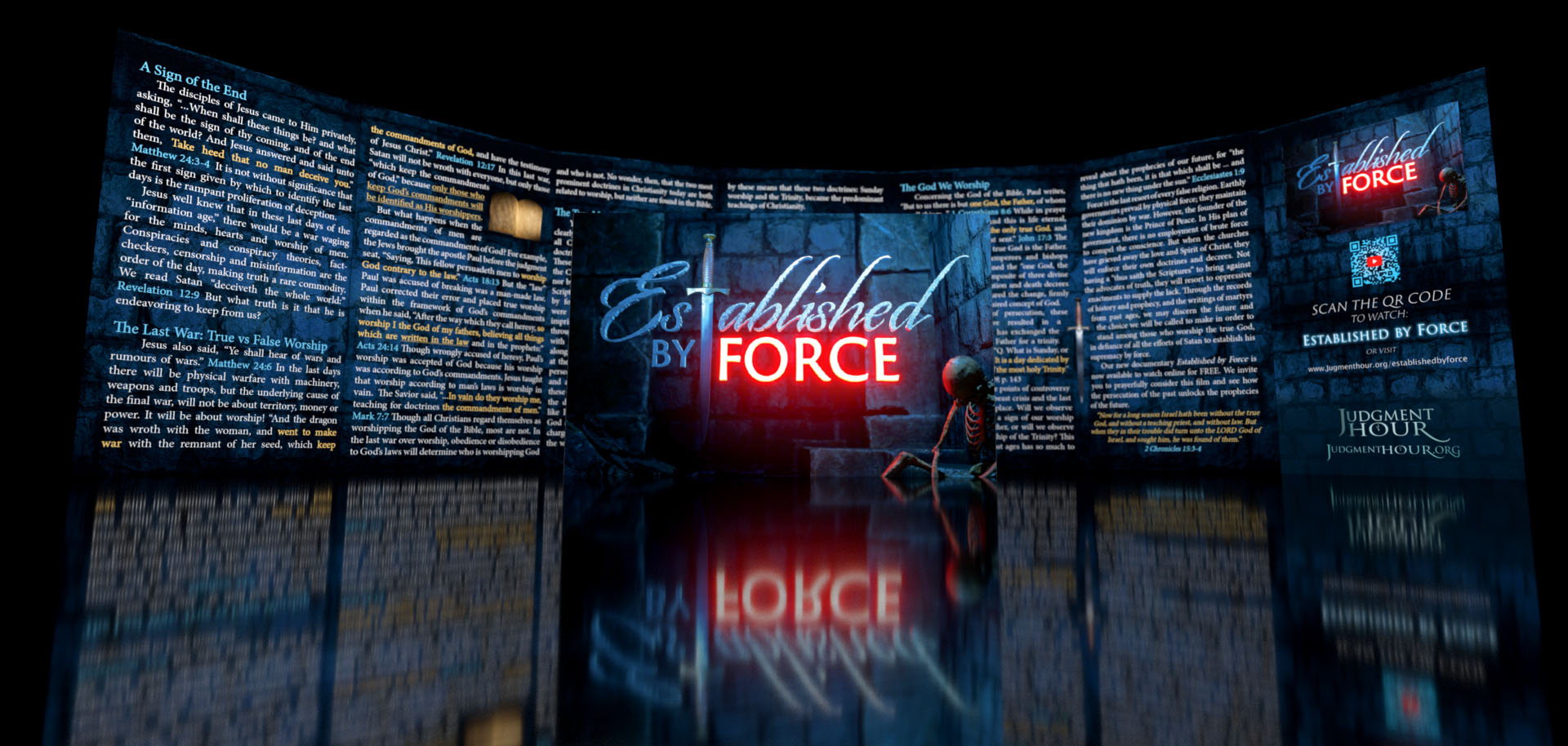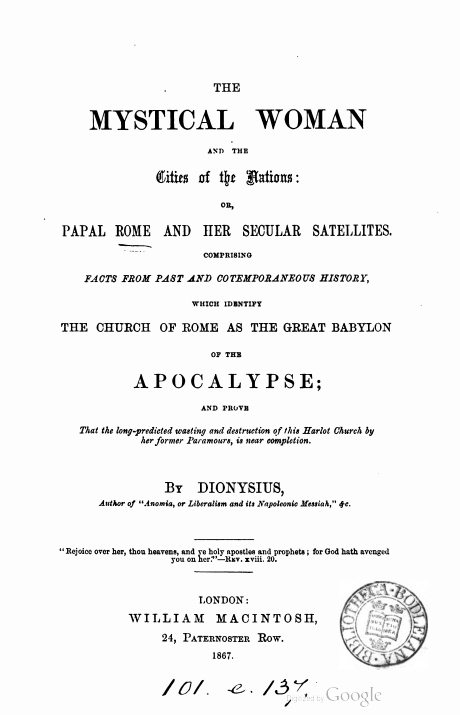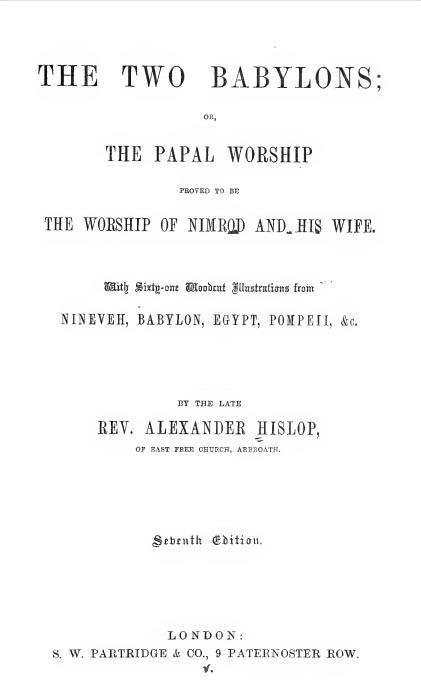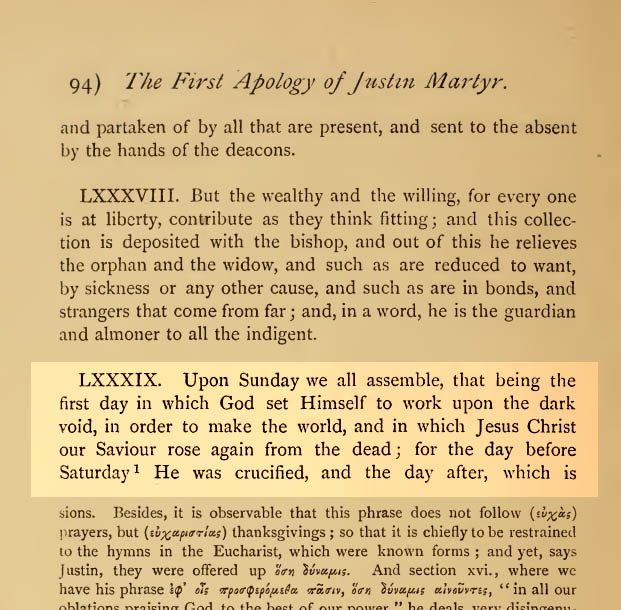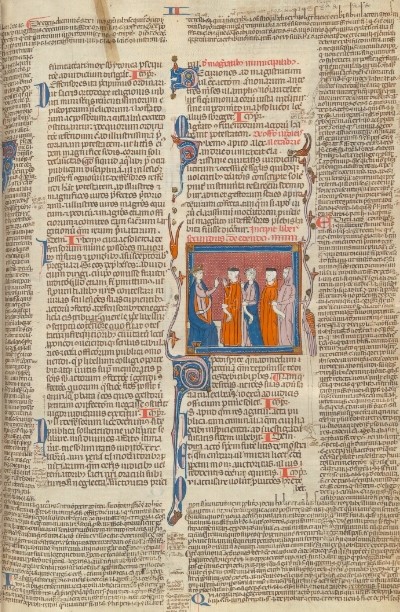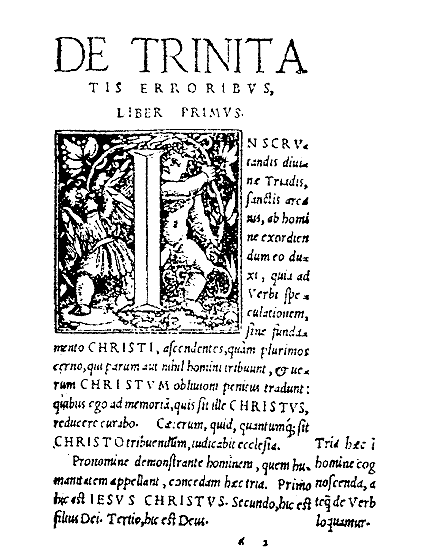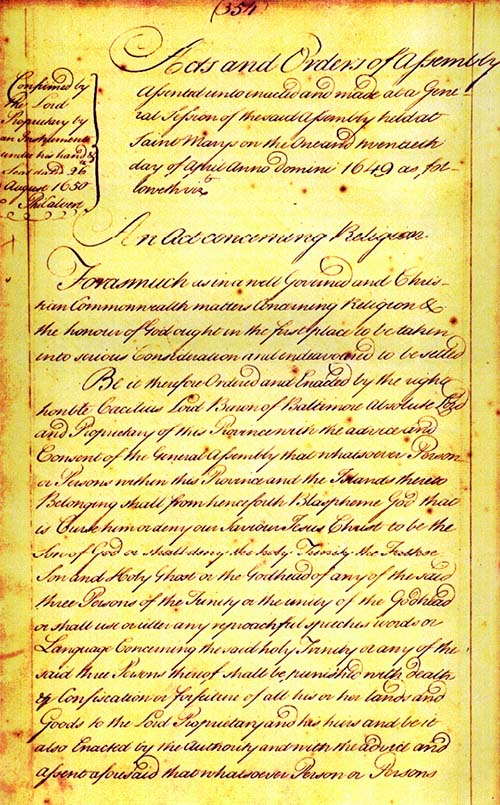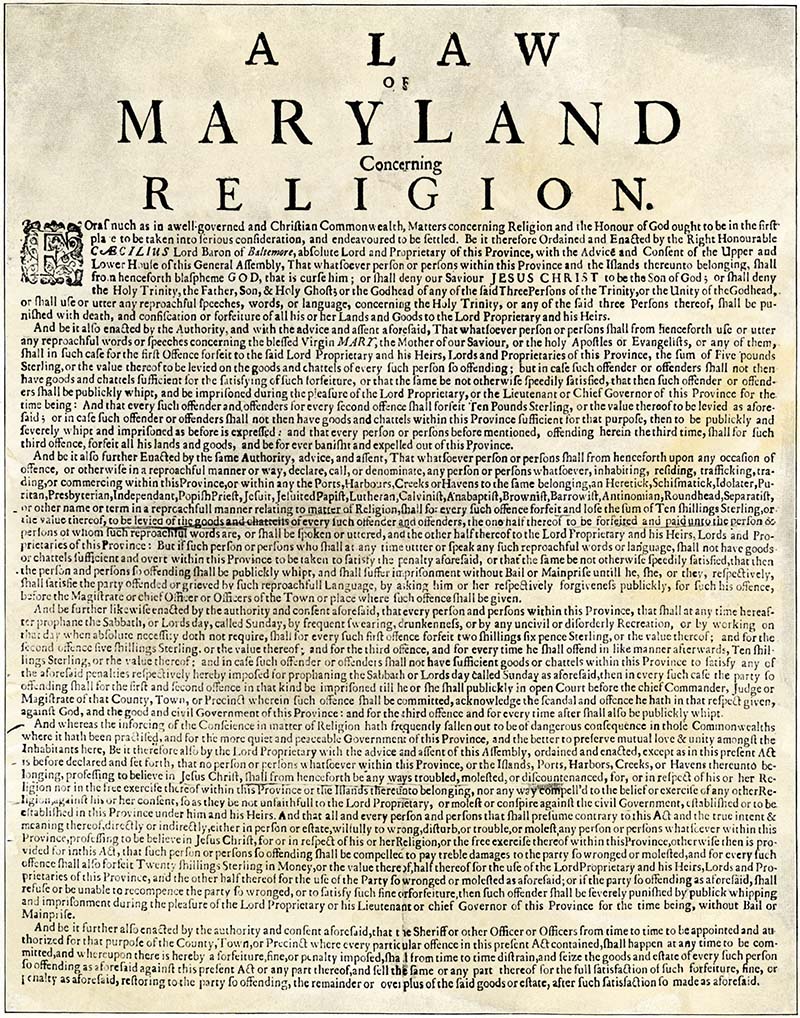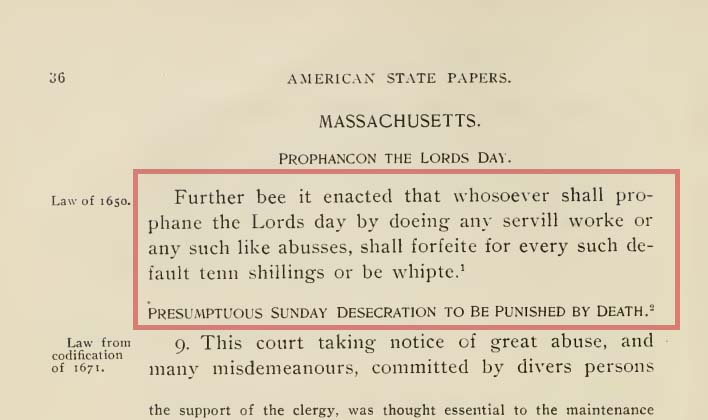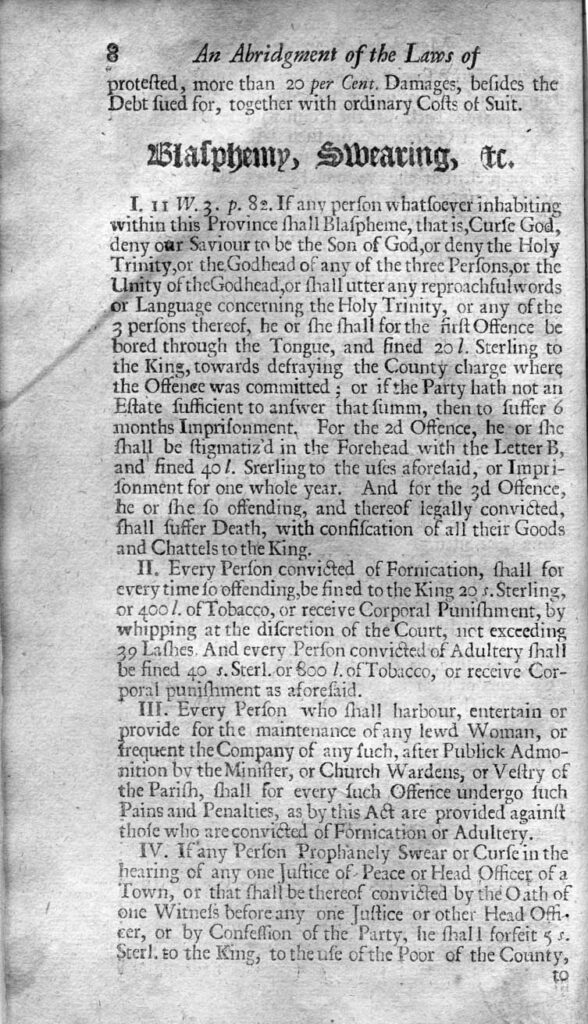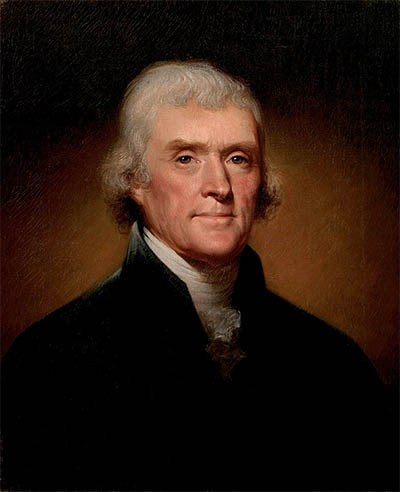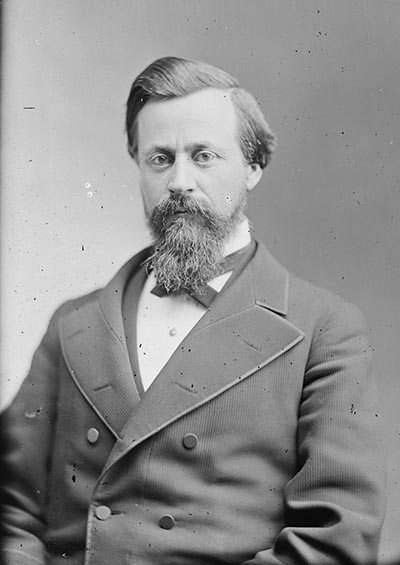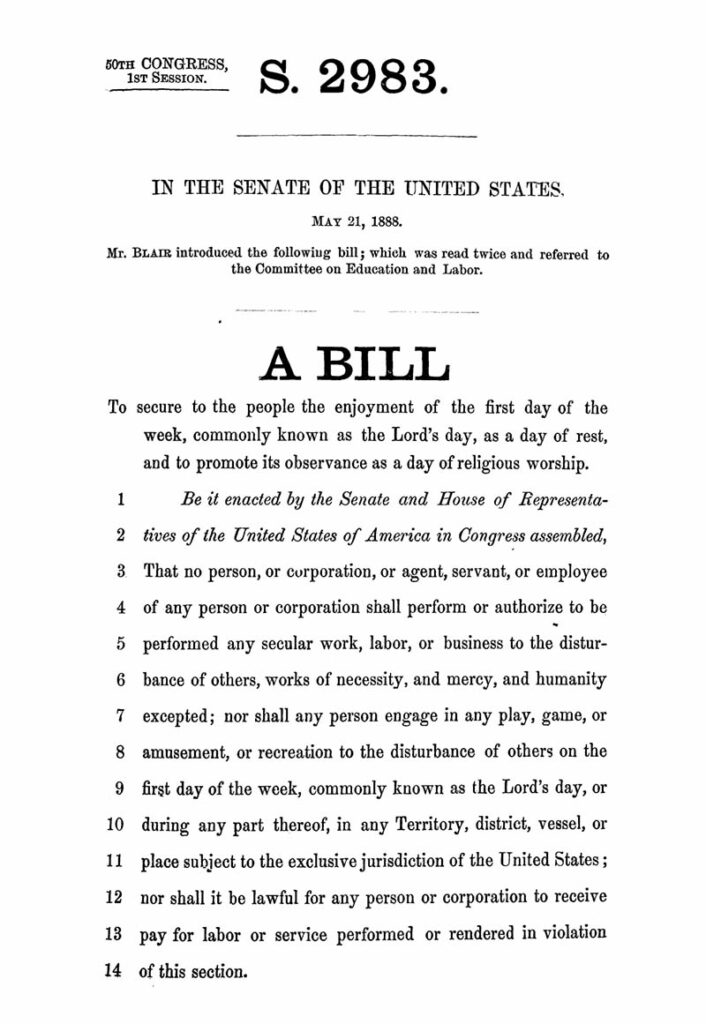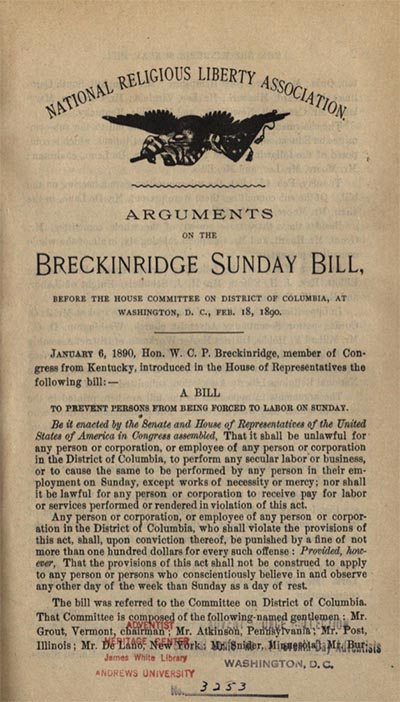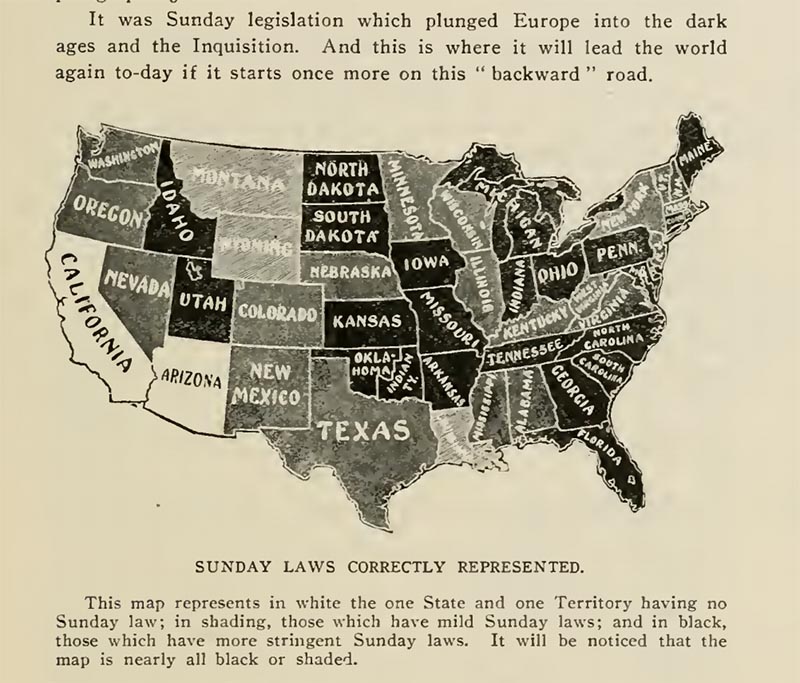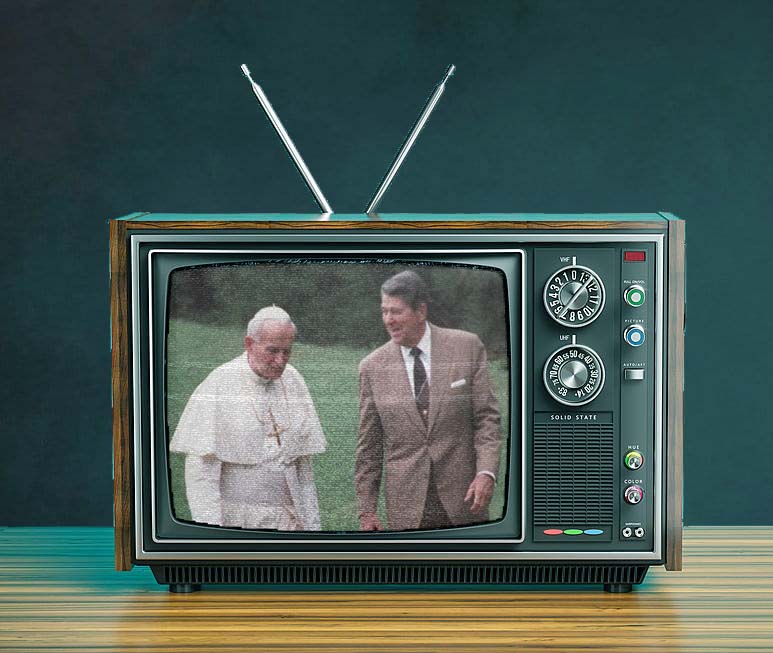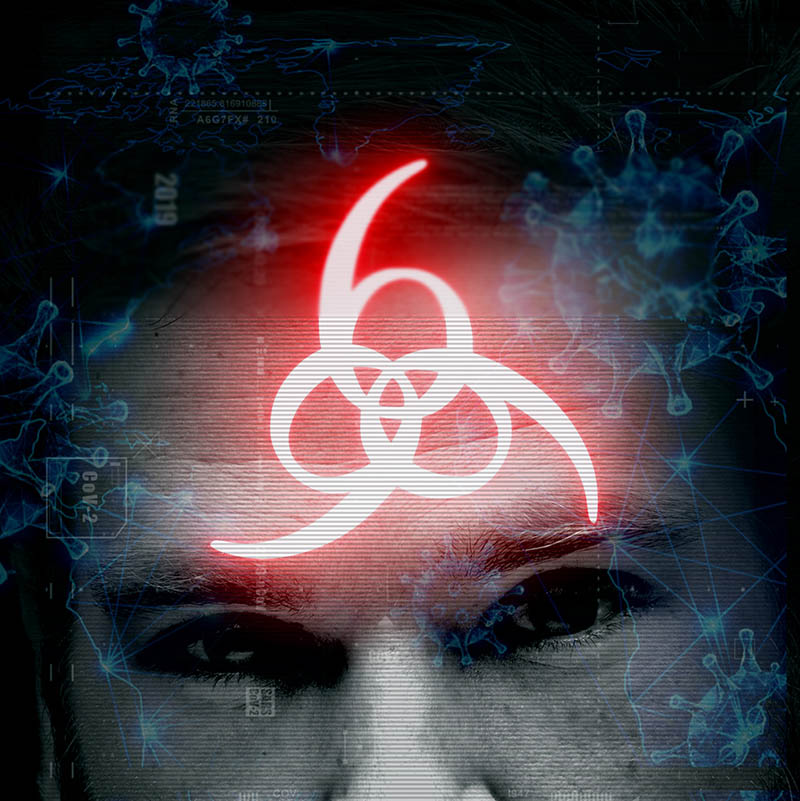Resources & References
Christians today would be aghast to discover the two most prominent doctrines in the Christian world did not come to such a place of prominence through the command of Christ or the apostles, or by the revelation of prophets or humble and pious men as they studied the Scriptures. Rather, these two doctrines were established by force — through centuries of inquisitions and torture and by death penalty. Will Christians recognize in the patterns of persecution through history, the snare Satan has laid for the future before its too late?
Video Transcript (English PDF)
True Worship vs. False Worship

The last war to be waged on Earth, will be a war over worship. In Revelation 13, the Bible states concerning a second beast power, he “causeth the earth and them which dwell therein to worship the first beast.” (Rev 13:11) For this reason, God warns the last generation saying “If any man worship the beast and his image, and receive his mark in his forehead, or in his hand, The same shall drink of the wine of the wrath of God…” (Rev 14:9) It is imperative therefore, that we know and understand what constitutes true worship, and what constitutes false worship.
Seventh-day Sabbath A Sign of the True God
“And hallow my sabbaths; and they shall be a sign between me and you that ye may know
that I am the LORD your God.“
Ezekiel 20:20
We Worship the True God through His Only Begotten Son
“he that acknowledgeth the Son
hath the Father also.“
1 John 2:23
“no man cometh unto the Father,
but by me..“
John 14:6
Seventh-day = A Sign of the Worship of the True God Through His Only Begotten Son
The observance of the Seventh-day Sabbath, has through all time, been a sign of the worship of the True God who created the Heavens and the Earth, “for all the gods of the nations are idols: but the LORD made the heavens.” (Psalms 96:5) By the observance of the Seventh-day Sabbath, men have through all ages, directed their worship to the only true God in distinction from all false gods. For this reason, Satan has, endeavored in all ages, to compel God’s people to transgress the Sabbath and to deny the Father and the Son. Satan has accomplished this by mingling false doctrines with the Christian faith, and establishing them by force. Two of these false doctrines in particular, involve redefining the sabbath day, and redefining the God who gave it.
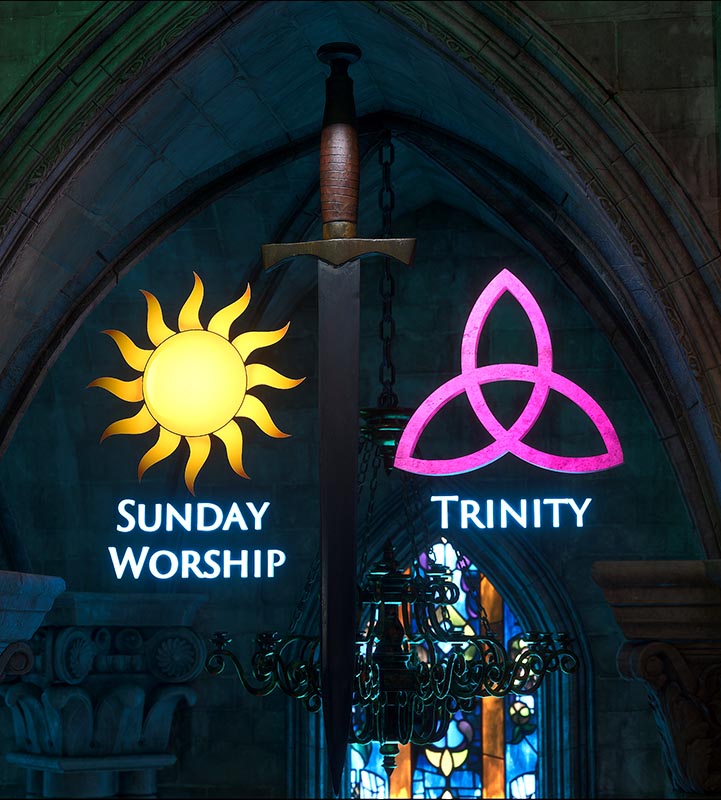
Two Principle Doctrines
The two most prominent doctrines in the Christian world are without question, the doctrine of Sunday worship and the Trinity. Yet, these two doctrines were only introduced into Christianity well after the time of Christ in the first few centuries. Those who opposed these two doctrines were subject to numerous edicts, decrees and laws by Roman emperors and Papal bishops. The transgressors of these man-made laws were stripped of their churches, their rights to minister, and even their writings and their lives were extinguished by the flames. This continued for more than a thousand years until the vast majority were inclined to believe these doctrines to be based on scripture; and this is where we are today. Before Jesus returns and all are brought to make a decision whom they will obey (Rom 6:16), God will continue to restore these Truths and all will have an opportunity to free themselves from Satan’s snares.
Though not integrated into the Christian faith until the fourth century, both of these doctrines find their origins much earlier — all the way back in Babylon.
2200 B.C.
Originating from Babylon

“The violent death of Nimrod led to a suppression of the false religion. However, it was revived in secret by his wife Semiramis. She claimed that Nimrod was now a god in the form of the sun, of which his earthly representation was fire [1, page 228]. She later gave birth to a child, who was supposedly the reincarnation of the hero Nimrod, now the sun god. The child is known under various names, of which one of the most important names is “Tammuz” [1, pages 21 and 228] [2, page 3].” Mystery, Babylon the Great by I.A. Sadler, Volume 1, p9-10 (PDF)
“The ancient Babylonians recognised the doctrine of a trinity, or three persons in one god as appears from a composite god with three heads forming part of their mythology, and the use of the equilateral triangle, also, as an emblem of such trinity in unity.” The Mystical Woman and the Cities of the Nations by Thomas Dennis Rock, 1867, p22-23 (PDF)
“All these have existed from ancient times. While overlaid with idolatry, the recognition of a trinity was universal in all the ancient nations of the world…” The Two Babylons, pp. 18
Throughout the Bible, God has made it unequivocally clear the Sabbath day derives its significance from the fact it is a sign of the worship of the “only True God, and Jesus Christ…” (John 17:3) For thus saith the Lord, “hallow my sabbaths; and they shall be a sign between me and you, that ye may know that I am the LORD your God.“ (Ezekiel 20:20)
What follows below, are a variety of Bible verses, Ellen White statements and publications from the early Seventh-day Adventist church, demonstrating the importance and significance of the Sabbath as a sign of the worship of the True God and of separation from all idols.
“Nimrod is also attributed with introducing the worship of the sun. This included in its rites the worship of fire, since fire was considered to be the earthly representation of the sun. The sun god was worshipped from the earliest times under the name of “Baal” [1, page 226]. Thus, Nimrod led a great rebellion against God.” Mystery, Babylon the Great, Volume 1, I.A. Sadler p9
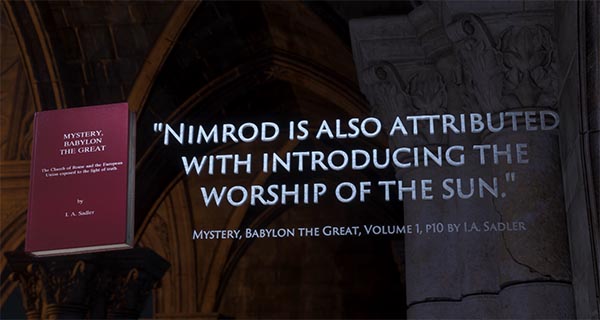
“Nimrod built what we call the Tower of Babel. It was a ziggurat or temple built in the form of a pyramid for the purpose of worshipping the sun and exalting Nimrod as the high priest of the sun. This temple was to be the center of his empire. Nimrod was a great promoter who presented himself as the human incarnation of the sun god. This was the beginning of sun worship and emperor worship and all pagan religions.” Dr. Richard Booker, The End of All Things is at Hand, p51
1440 B.C.
Egypt

“And the king of Egypt said unto them, Wherefore do ye, Moses and Aaron, let the people from their works? get you unto your burdens. And Pharaoh said, Behold, the people of the land now are many, and ye make them REST from their burdens. And Pharaoh commanded the same day the taskmasters of the people, and their officers, saying, Ye shall no more give the people straw to make brick, as heretofore: let them go and gather straw for themselves.” Exodus 5:4-7
“Sun worship was also prevalent in the ancient Egyptian and Babylonian civilizations. The ancient Egyptian god of creation, Amun, is believed to reside inside the sun. Also in Egypt, there was a religion that worshipped the sun directly,” says Dutt.” PU English Department head, Shankar Ashish Dutt, https://timesofindia.indiatimes.com/city/patna/sun-god-worshipped-across-cultures/articleshow/71826105.cms
“Three became the most universal number of deity. Sun worship is one of the most primitive forms of religion, and early man sometimes distinguished between rising, midday, and setting sun. The Egyptians, for example, divided the sun god into three deities: Horus, rising sun, Ra or Re, midday sun, and Osiris, old setting sun.” Egyptian Deities, New International Encyclopedia. NY: Dodd, 1917. Volume 7, p. 529
“Isis, Horus, Seb,” that is, ” The Mother, the Child, and the Father of the gods,” —in other words, “The Egyptian Trinity.” The Two Babylons by Alexander Hislop, p164 (PDF)
“The Hymn to Amun decreed that ‘No god came into being before him (Amun)’ and that ‘All gods are three: Amun, Re and Ptah, and there is no second to them. Hidden is his name as Amon, he is Re in face, and his body is Ptah.’ . . . This is a statement of trinity, the three chief gods of Egypt subsumed into one of them, Amon. Clearly, the concept of organic unity within plurality got an extraordinary boost with this formulation. Theologically, in a crude form it came strikingly close to the later Christian form of plural Trinitarian monotheism” (Simson Najovits, Egypt, Trunk of the Tree, Vol. 2, 2004, pp. 83-84). https://www.ucg.org/bible-study-tools/booklets/is-god-a-trinity/how-ancient-trinitarian-gods-influenced-adoption-of-the-trinity
135 A.D.
Hadrian Edict
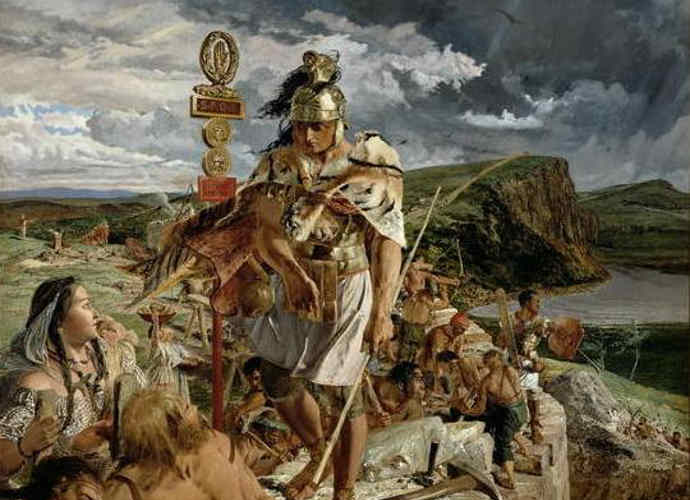
Bishop Jeremy Taylor reacting to Justin Martyr’s reasoning for observing the first day of the week instead of the seventh, wrote:
“The first of these looks more like an excuse than a just reason; for if anything of the creation were made the cause of a Sabbath, it ought to be the end, not the beginning; it ought to be the rest, not the first part of the work; it ought to be that which God assigned, not [that] which man should take by way of after justification.” History of the Sabbath and the First Day of the Week, JN Andrews, p269-270, Quoted from “Ductor Dubitantium, part i . book ii . chap. ii . rule 6, sect. 45.”
“No clear references to Sunday as a day of Christian worship are found until the writings of Barnabas and Justin, around A.D. 135 and 150, respectively. Observance of Sunday as the primary day of worship appears to have begun to solidify during the reign of Emperor Hadrian (A.D. 117-135), who harshly persecuted Jews throughout the Roman Empire. Hadrian specifically prohibited practices of Judaism, including observance of the seventh-day Sabbath. These oppressive measures apparently influenced many early Christians in Rome to abandon the seventh day and turn to Sunday, the day for honoring the sun god among the Romans and other peoples of the ancient world. When Christianity was declared the official religion of the Roman Empire in the fourth century, the process accelerated.” https://www.ucg.org/bible-study-tools/booklets/sunset-to-sunset-gods-sabbath-rest/which-day-is-the-sabbath
“The shift in the early church toward worshiping on Sunday began in the 2nd century during the reign of Emperor Hadrian, who “promulgated the most anti-Jewish, anti-Sabbath laws” after Jewish revolts in Palestine… To avoid the repressive laws, Christians moved their celebrations to the first day of Creation, the “day of the sun.” – The Washington Post
To avoid the oppressive anti-Sabbath laws, Christian converts were “motivated” to move their day of worship to the same day on which the Romans worshipped the sun. Seeking to justify their adoption of the Roman sun day, Justin Martyr offered the following reasoning:
“Upon Sunday we all assemble, that being the first day in which God set himself to work upon the dark void in order to make the world, and in which Jesus Christ our Saviour rose again from the dead…” The First Apology of Justin Martyr, p270
“The Edict of Hadrian prohibits the practice of circumcision. Additionally, Hadrian prohibits public reading of the Torah under penalty of death, as well as observance of festivals and the Sabbath, the teaching of Judaic Law, and the ordination of rabbis.” https://en.wikipedia.org/wiki/130s
312 A.D.
Constantine

“Constantine was a pagan monotheist, a devotee of the sun god Sol Invictus, the unconquered sun. However before the Milvian Bridge battle he and his army saw a cross of light in the sky above the sun with words in Greek that are generally translated into Latin as In hoc signo vinces (‘In this sign conquer’). That night Constantine had a dream in which Christ told him he should use the sign of the cross against his enemies. He was so impressed that he had the Christian symbol marked on his soldiers’ shields and when the Milvian Bridge battle gave him an overwhelming victory he attributed it to the god of the Christians.”
– HistoryToday.com, The Battle of Milvian Bridge
“…history divulges that the alleged follower of Jesus murdered an already vanquished rival, killed his wife by having her boiled alive in her own bath – and murdered an innocent son.” – Doctrine of the Trinity: Christianity’s Self-inflicted Wound by Anthony F. Buzzard and Charles Hunting p139 (German)
318 A.D.
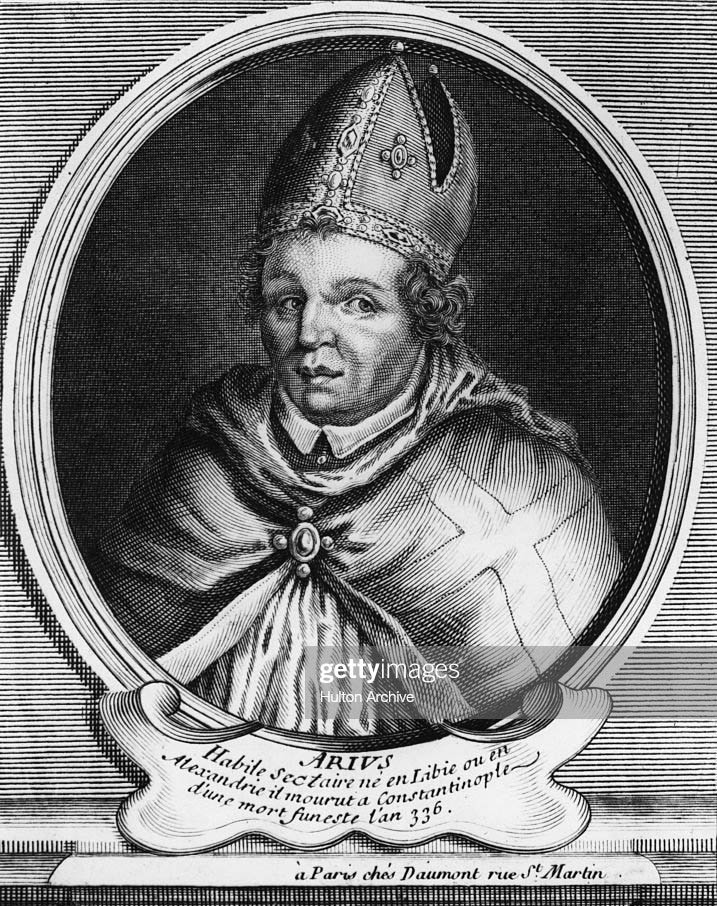
Arius' Letter to Eusebius
“(1.) To that most beloved man of God, the faithful and orthodox Eusebius, from Arius, unjustly persecuted by father Alexander because of the all-conquering truth which you, Eusebius, also are defending!
(2.) Since my father Ammonius is going to Nicomedia, it seemed reasonable and proper to greet you through him, remembering at the same time the innate love and affection which you have for the brothers on account of God and his Christ, because the bishop [Alexander] is severely ravaging and persecuting us and moving against us with every evil. Thus he drives us out of every city like godless men, since we will not agree with his public statements: that there was “always a God, always a Son;” “as soon as the Father, so soon the Son [existed];” “with the Father co-exists the Son unbegotten, ever-begotten, begotten without begetting;” “God neither precedes the Son in aspect or in a moment of time;” “always a God, always a Son, the Son being from God himself.
(3.) Since Eusebius, your brother in Caesarea, and Theodotus, and Paulinus, and Athanasius, and Gregory, and Aetius and all those in the East say that God pre-exists the Son without a beginning, they have been condemned, except for Philogonius and Hellenicus and Macarius, unlearned heretics some of whom say that the Son was “spewed out”, others that he was an “emanation”, still others that he was “jointly unbegotten.” (4.) We are not able to listen to these kinds of impieties, even if the heretics threaten us with ten thousand deaths. But what do we say and think and what have we previously taught and do we presently teach? — that the Son is not unbegotten, nor a part of an unbegotten entity in any way, nor from anything in existence, but that he is subsisting in will and intention before time and before the ages, full <of grace and truth,> God, the only-begotten, unchangeable. (5.) Before he was begotten, or created, or defined, or established, he did not exist. For he was not unbegotten. But we are persecuted because we have said the Son has a beginning but God has no beginning. We are persecuted because of that and for saying he came from non-being. But we said this since he is not a portion of God nor of anything in existence. That is why we are persecuted; you know the rest.
I pray that you fare well in the Lord, remembering our tribulations, fellow-Lucianist, truly-called Eusebius [i.e. the pious one].” – Theodoret, Church History 1.5, 318 AD. http://www.fourthcentury.com/index.php/urkunde-1/
321 A.D.
The First Sunday Law
“On the venerable day of the sun let the magistrate and people residing in cities rest, and let all workshops be closed.” – Constantine, Domini Nostri Sacrataissim Principis Justinian Codex, Sec. 3.12.2 (PDF in Latin. See Sec. 3.12.2
“The first-century Christian Church worshipped on the seventh day of the week, which we now call Saturday. But when Roman Emperor Constantine, a pagan sun-worshipper, enforced his own version of Christianity in his empire, he mandated Sunday worship. He gave the following edict in 321 AD: “Let all magistrates and people of the city… rest on the venerable day of the Sun.” (The New Schaff-Herzog Encyclopedia of Religious Knowledge, “Roman Legislation for Sunday,” vol. XI, p. 147) – https://www.lcg.org/beliefs/jesus-and-apostles-observed-sabbath-day
325 A.D.
Council of Nicaea
“The First Council of Nicaea was the first ecumenical council of the church. Most significantly, it resulted in the first uniform Christian doctrine, called the Nicene Creed. With the creation of the creed, a precedent was established for subsequent local and regional councils of bishops (synods) to create statements of belief and canons of doctrinal orthodoxy—the intent being to define unity of beliefs for the whole of Christendom… One purpose of the Council was to resolve disagreements arising from within the Church of Alexandria over the nature of Jesus in his relationship to the Father: in particular, whether the Son had been ‘begotten’ by the Father from his own being, and therefore having no beginning, or else created out of nothing, and therefore having a beginning.[13] St. Alexander of Alexandria and Athanasius took the first position; the popular presbyter Arius, from whom the term Arianism comes, took the second. The Council decided against the Arians overwhelmingly (of the estimated 250–318 attendees, all but two agreed to sign the creed, and these two, along with Arius, were banished to Illyria).” – Wikipedia
Note: While Wikipedia and most historical sources represent Arius as believing Jesus was “created out of nothing,” this appears to be a misrepresentation, as Arius himself wrote Christ was “the only-begotten,” saying “we are persecuted because we have said the Son has a beginning but God has no beginning.” – Theodoret, Church History 1.5, 318 AD. http://www.fourthcentury.com/index.php/urkunde-1/
Did Arius Believe Jesus Was Created?
“The Roman clergy claimed that Christianity had found in the Greek word homoousios [Homo-oozious] (in English, “consubstantiality”) an appropriate term to express this relationship. Then the papal party proceeded to call those who would not subscribe to this teaching, Arians, while they took to themselves the title of Trinitarians. An erroneous charge was circulated that all who were called Arians believed that Christ was a created being. This stirred up the indignation of those who were not guilty of the charge.” – B.G. Wilkinson, Truth Triumphant p85
“And yet notwithstanding all these Things, when Alexander gives an Account of the Principles of Arius to the Bishops, he represents them in all the Consequences he thought fit to draw from them, and charges him [Arius] with holding, that the Son was made like every other creature absolutely out of nothing, and that therefore his Nature was mutable, and susceptive equally of Virtue and Vice; with many other insidious and unscriptural Doctrines, which Arius plainly appears not to have maintained or taught.” – Limborch, The History of the Inquisition, p.25
“It is doubtful if many believed Christ to be a created being. Generally, those evangelical bodies who opposed the Papacy and who were branded as Arians confessed both the divinity of Christ and that He was begotten, not created, by the Father.” – B.G. Wilkinson, Truth Triumphant p429 Note 41
Two Greek Words
“However, a great trouble arose, since there are two terms in Greek of historical fame. The first, homos, meaning “identical,” and the second, homoios, meaning “similar” or “like unto,” had both of them a stormy history. The spelling of these words is much alike. The difference in meaning, when applied to the Godhead, is bewildering to simple-hearted believers. Nevertheless, those who would think in terms of homoiousian, or “similar,” instead of homoousian, or “identical,” were promptly labeled as heretics and Arians by the clergy. Yet when the emperor, Constantine, in full assembly of the Council of Nicaea, asked Hosius, the presiding bishop, what the difference was between the two terms, Hosius replied that they were both alike. At this all but a few bishops broke out into laughter and teased the chairman with heresy.” – B.G. Wilkinson, Truth Triumphant p85
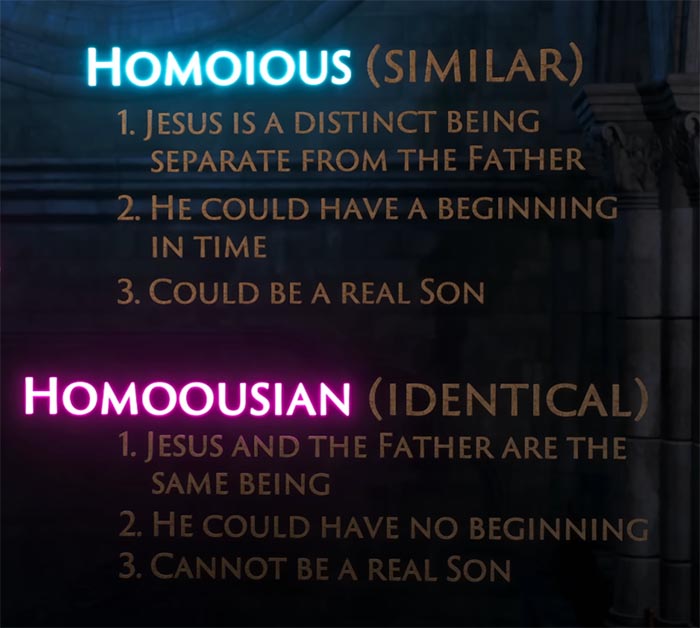
Acceptance of the Creed of Nicaea Established by Persecution
“The Emperor exerted all his influence toward winning unanimous acceptance and nearly succeeded. Only two bishops stood out against it; but two other senior bishops refused to sign the anathemas against Arius and were exiled.” – The Rise of Christianity, 1985 by W.H.C. Frend p499
“Over-awed by the emperor, the bishops, with two exceptions only, signed the creed, many of them against their inclination. Constantine regarded the decision of Nicaea as divinely inspired. As long as he lived no one dared openly to challenge the creed of Nicaea.” – Encyclopedia Britannica 1968
“Neither the word “Trinity” nor the explicit doctrine appears in the New Testament, nor did Jesus and his followers intend to contradict the Shema in the Hebrew Scriptures: “Hear, O Israel: The Lord our God is one Lord” (Deuteronomy 6:4)… The doctrine developed gradually over several centuries and through many controversies.” – Encyclopedia Britannica
“A History of Christianity Volume 1,” Kenneth Latourette wrote “To enforce the decisions of the Council of Nicea, Constantine commanded, with the death penalty for disobedience, the burning of all books composed by Arius, banished Arius and his closest supporters, and deposed from their sees, Eusebius of Nicomedia and another bishop who had been active in the support of Arius.” – A History of Christianity Volume 1 1997 Kenneth Scott Latourette
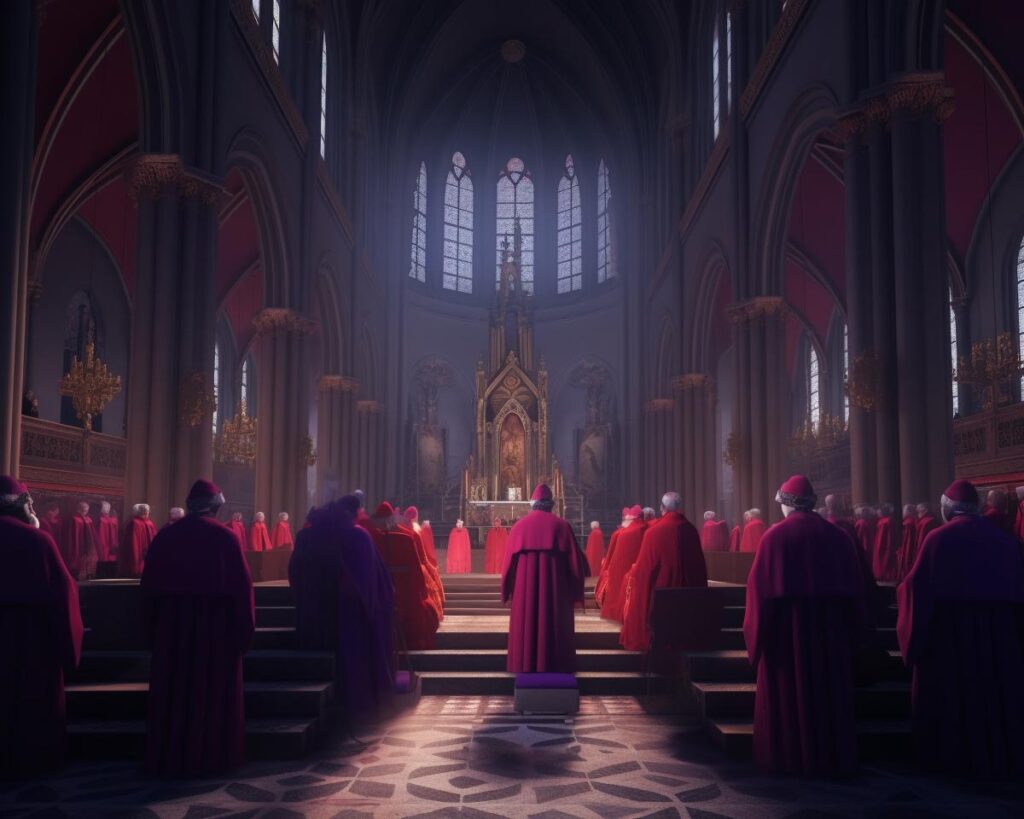
What Did Arius Believe?
“He [Arius] declared upon oath, that he held the doctrines set forth in this exposition… It was as follows: “Arius and Euzoius, presbyters, to Constantine, our most pious emperor and most beloved of God. According as your piety, beloved of God, commanded, O Sovereign emperor, we here furnish a written statement of our own faith, and we protest before God that we, and all those who are with us, believe what is here set forth. “We believe in One God, the Father Almighty, and His Son the Lord Jesus Christ, who was begotten from Him before all ages, God the Word, by whom all things were made, whether things in heaven or things on earth; He came and took upon Him flesh, suffered and rose again, and ascended into heaven, whence He will again come to judge the quick and the dead. We believe in the Holy Ghost, in the resurrection of the body, in the life to come, in the kingdom of heaven.” – Salminius Hermias Sozomen, (Fifth Century Historian), The ecclesiastical history of Sozomen : comprising a history of the church from A. D. 324 to A. D. 440, p.94
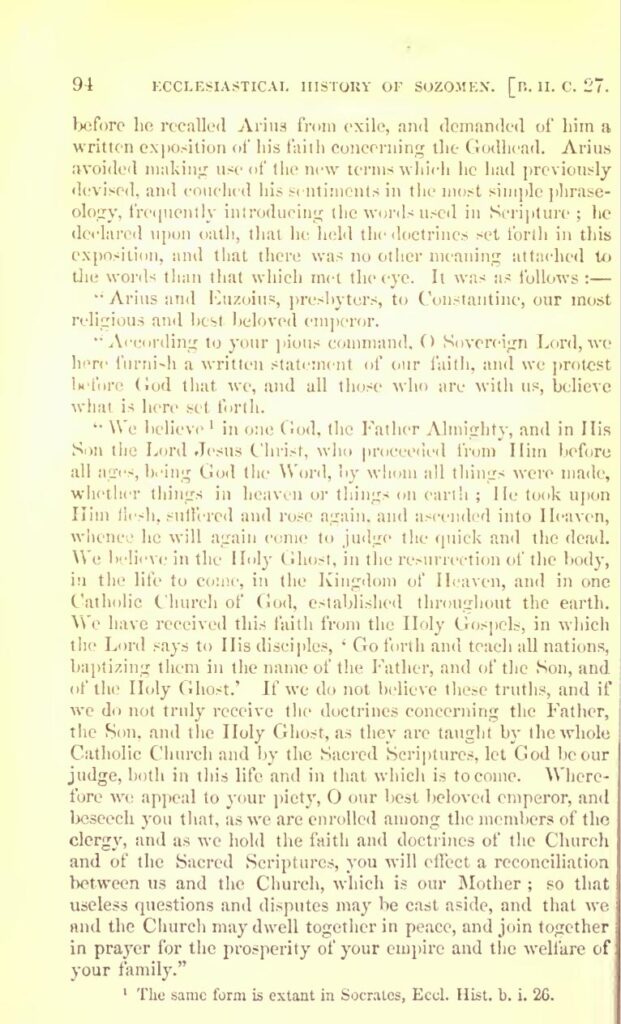
Constantine’s Edict
“If any writing composed by Arius should be found, it should be handed over to the flames, so that not only will the wickedness of his teaching be obliterated, but nothing will be left even to remind anyone of him. And I hereby make a public order, that if someone should be discovered to have hidden a writing composed by Arius, and not to have immediately brought it forward and destroyed it by fire, his penalty shall be death. As soon as he is discovered in this offence, he shall be submitted for capital punishment.” – Edict by Emperor Constantine against the Arians, Fourthcentury.com. 23 January 2010. Archived from the originalon 19 August 2011. Retrieved 20 August 2011, https://en.wikipedia.org/wiki/Arianism
The Rise of Antichrist
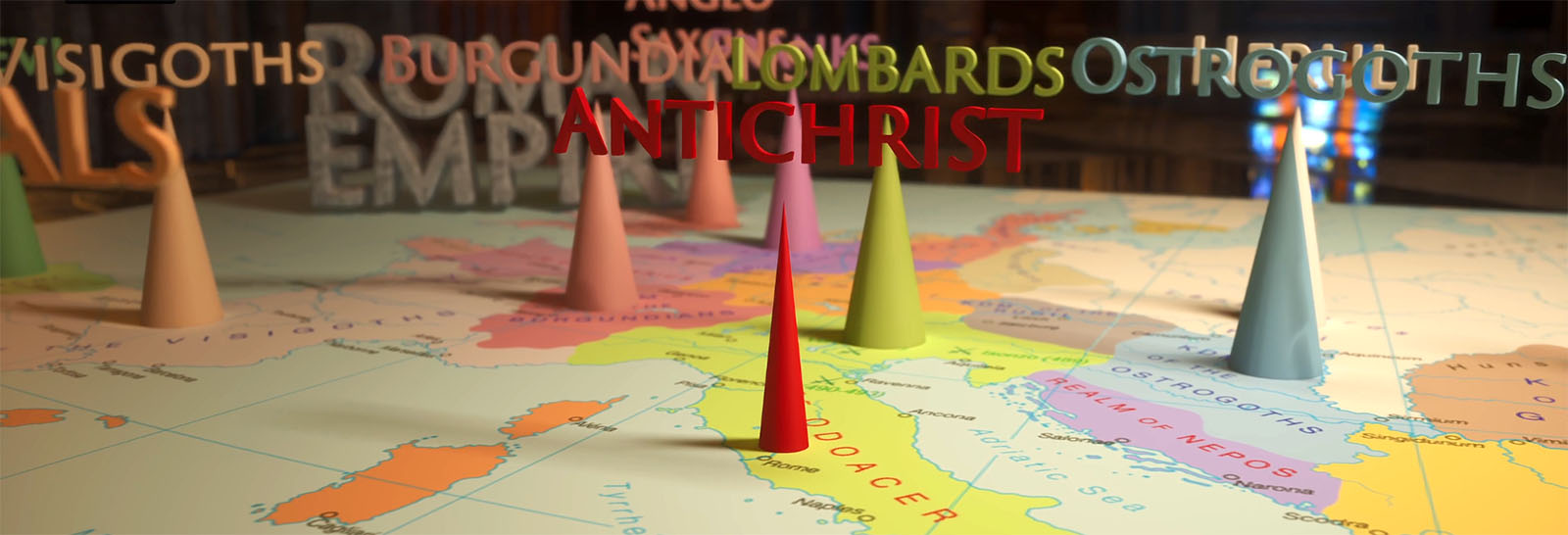
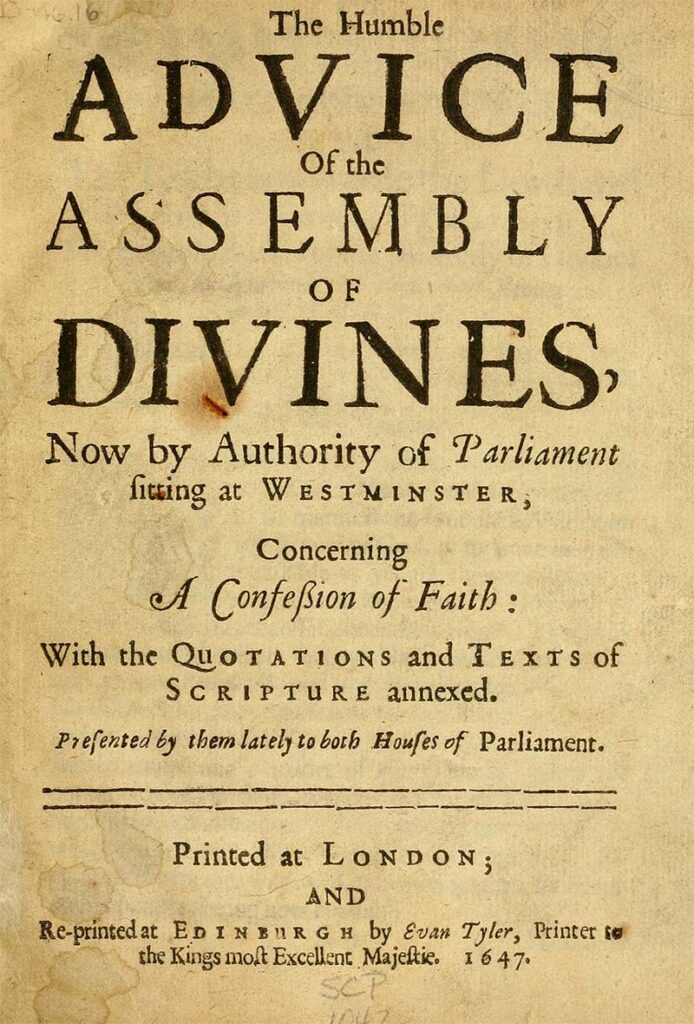
Identifying Antichrist
“There is no other head of the Church but the Lord Jesus Christ: nor can the Pope of Rome in any sense be head thereof; but is that Antichrist, that man of sin and son of perdition, that exalts himself in the Church against Christ, and all that is called God.” – 1646 Westminster Confession of Faith, Chapter 25, Sec. VI
“…as to what Antichrist is no sane man ought to raise a question. If it be not the popery in the Church of Rome there is nothing in the world that can be called by that name. If there were to be issued a hue and cry for Antichrist, we should certainly take up this church on suspicion, and it would certainly not be let loose again, for it so exactly answers the description.” – Charles Spurgeon, from a sermon delivered on Sunday Morning, October 21, 1866 at the Metropolitan Tabernacle, Newington, also published in The Complete Works of Charles Spurgeon: Volume 12, 1866 (Harrington, DE: Delmarva Publications, 2013), #717
“Christ has many enemies still in the world. The Pope, the Antichrist of Rome, with all his doctors and counselors, assemble at this very hour—the incarnate Antichrist—at this present moment. And here in this England of ours there are priests busy up and down, in every court and lane, in every corner of the land, and our clergy of the Established Church, many of them double-dyed Papists, doing the work of Rome and eating the bread of a Protestant church at the same time.” – Charles Spurgeon, Sermon published, October 8, 1914 at the Metropolitan Tabernacle, Newington on Thursday Evening, July 21, 1870
“The oracles of God foretold the rising of an Antichrist in the Christian Church; and in the Pope of Rome, all the characteristics of that Antichrist are so marvelously answered that if any who read the Scriptures do not see it, there is a marvelous blindness upon them.” – The Fall of Babylon by Cotton Mather, cited in The Prophetic Faith of Our Fathers, Vol. 3, pg. 154
“there came up among them another little horn, before
whom there were three of the first horns plucked up by the roots:“
Daniel 7:8
“The three horns plucked up before it were the Heruli, the Ostrogoths, and the Vandals. And the reason why they were plucked up was because they were opposed to the arrogant claims of the papal hierarchy, and hence to the supremacy in the church of the bishop of Rome.” – Daniel and the Revelation by Uriah Smith, p153
“..it is evident that the spread of Arianism would check the influence of the Catholics; and the possession of Rome and Italy by a people of the Arian persuasion, would be fatal to the supremacy of a Catholic bishop. But the prophecy had declared that this horn would rise to supreme power, and that in reaching this position it would subdue three kings.” – Daniel and the Revelation, 1897 by Uriah Smith, p165-166
“And with respect to the Arians, he [Constantine] banished Arius himself, ordered all his Followers, as absolute Enemies of Christ, … ordained that the Books written by them should be burnt, that there might be no Remains of their Doctrine left to Posterity, and cruelly commanded, that if ever any one would dare to keep in his Possession any Book written by Arius, and should not immediately burn it, he should be no sooner convicted of the Crime but he should suffer Death. Thus the Orthodox first brought in the punishment of Heresy with Death, and persuaded the Emperor to destroy those whom they could not easily convert. The Scriptures were now no longer the Rule and Standard of the Christian Faith.” – Limborch, The History of the Inquisition, p.30
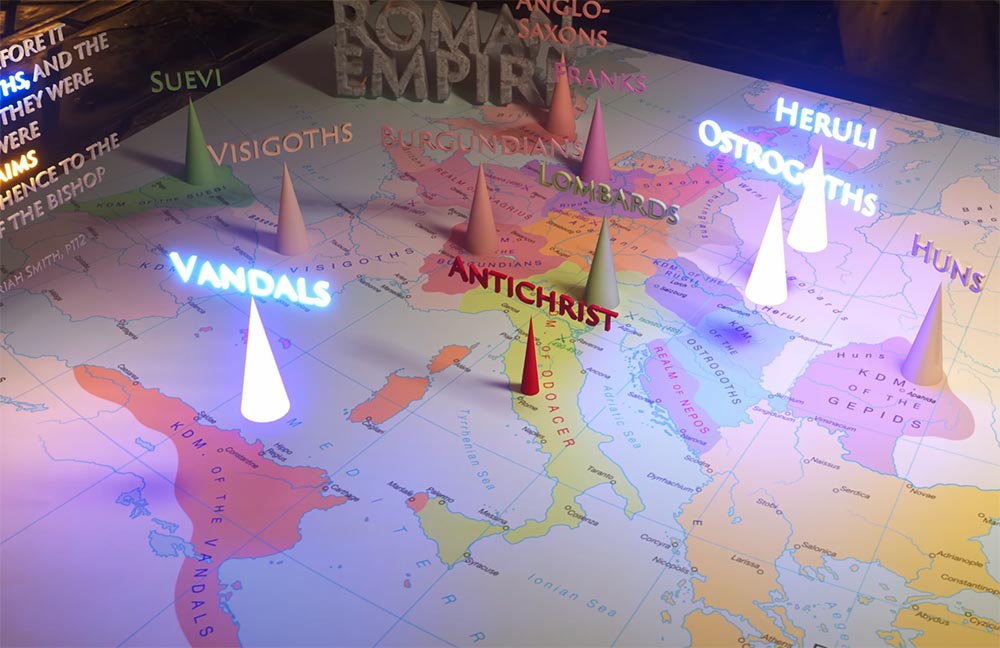
“No sooner had he [bishop Meletius] been installed, than he openly declared for the Homoousion,” meaning in favor of the Nicene creed and the doctrine of the trinity, “and excommunicated “as rotten and incurable members,” all who held the contrary doctrine. The bishops round about pleaded with him to conduct his office in the spirit in which he had been elected to it, instead of making matters worse by his extreme position. It was all of no avail. He declared that “nothing should, and nothing could, make him desist from, or relent in, the work he had undertaken, till he had utterly extirpated the Arian heresy, without leaving the least shoot of so poisonous a weed in the field which by divine appointment he was to guard and cultivate.” – Archibald Bower, History of the Popes p90 also cited from The Great Empires of Prophecy, from Babylon to the Fall of Rome by AT Jones p548
BBC Documentary detailing the censorship and removal by the Romans, of the Gothic King Theoderic and his court from the walls of the chapel he commissioned.
“To promote Arianism, the king commissioned a small Arian cathedral, the Hagia Anastasis, which contains the Arian Baptistery.” – Johnson, Mark J. (1988). “Toward a History of Theoderic’s Building Program.” Dumbarton Oaks Papers. 42: 73–96.doi:10.2307/1291590. JSTOR 1291590, https://en.wikipedia.org/wiki/Theodoric_the_Great#CITEREFJohnson1988
364 A.D.
Council of Laodicea
Legislation Prohibiting the Keeping of God’s Sabbath on the Seventh-day
“Christians shall not Judaize and be idle on Saturday, but shall work on that day; but the Lord’s day they shall especially honor, and, as being Christians, shall, if possible, do no work on that day. If, however, they are found Judaizing, they shall be shut out from Christ.” – Helef’s History of the Councils of the Church, vol. 2, p. 252, Laodicea Canon 29
“The Pope has power to change times, to abrogate laws, and to dispense with all things, even the precepts of Christ. The Pope has authority and has often exercised it, to dispense with the command of Christ.”– Decretal, de Tranlatic Episcop
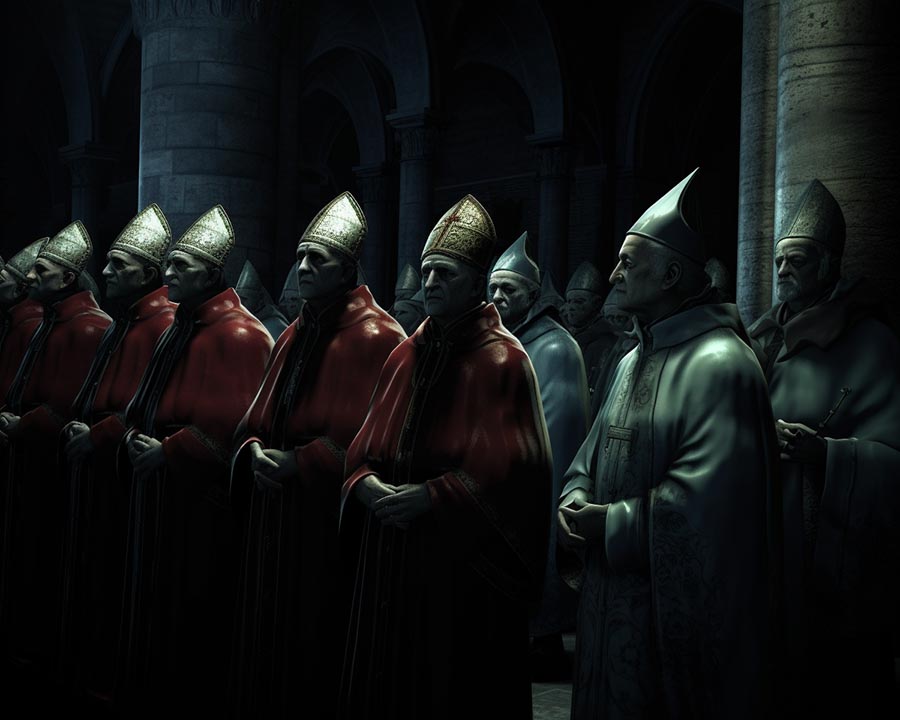
380 A.D.
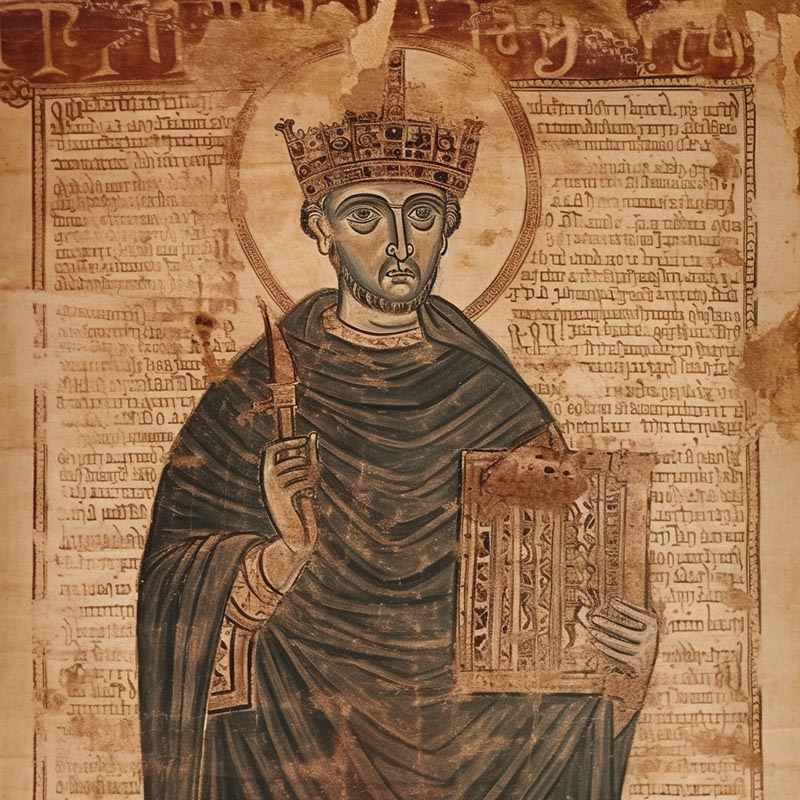
Trinity Law
“According to the discipline of the apostles, and the doctrine of the gospel, let us believe the sole deity of the Father, the Son, and the Holy Ghost, under an equal majesty, and a pious Trinity. We authorize the followers of this doctrine to assume the title of Catholic Christians, and as we judge that all others are extravagant madmen, we brand them with the infamous name of “heretics,” and declare that their conventicles shall no longer usurp the respectable appellation of churches. Besides the condemnation of divine justice, they must expect to suffer the severe penalties which our authority, guided by heavenly wisdom, shall think proper to inflict upon them.”
– Edward Gibbon, “The History of the Decline and Fall of the Roman Empire,” chap 27, p1091
“Theodosius soon came to Constantinople, and immediately on his arrival, summoned to his palace Damophilus, the Arian bishop of the city, and commanded him to subscribe to the Nicene Creed, or else surrender to the Catholics the episcopal palace, the cathedral, and all the churches of the city, which amounted to fully a hundred. Damophilus refused, and Nov. 24, A. D. 380, an edict was issued expelling all the Arians from all their houses of worship, and forfeiting the same to the Catholics, who in fact were barely able to fill the single house of worship which they already owned.” – The Great Empires of Prophecy, from Babylon to the Fall of Rome by AT Jones p547
381 A.D.
Council of Constantinople
“At the beginning of the year 381, Theodosius issued an edict expelling from all the churches within his dominions, all the bishops and other ecclesiastics who should refuse to subscribe to the creed of Nice. By a commissioned officer with a military force, the edict was executed in all the provinces of the East. Having thus established his religion throughout the empire, the next thing to do was to have a general council endorse his action, compose the disputes which disturbed the Catholic party itself, and again “settle” the faith of the Catholic Church. To this end a general council was called to meet at Constantinople this same year, A. D. 381.” – The Great Empires of Prophecy, from Babylon to the Fall of Rome by AT Jones p547
“The same question which had been so long discussed as to the nature of Christ was now up in regard to the nature of the Holy Spirit. Now, the question was whether the Holy Spirit is Homoousion” meaning of one substance, “with the Father and the Son. The Macedonians held that He is not. The council decided that He is.” – The Great Empires of Prophecy, from Babylon to the Fall of Rome by AT Jones p547
“The council of Constantinople declared finally the trinitarian doctrine of the equality of the Holy Spirit with the Father and the Son.” – Encyclopedia Britannica, https://www.britannica.com/event/First-Council-of-Constantinople-381
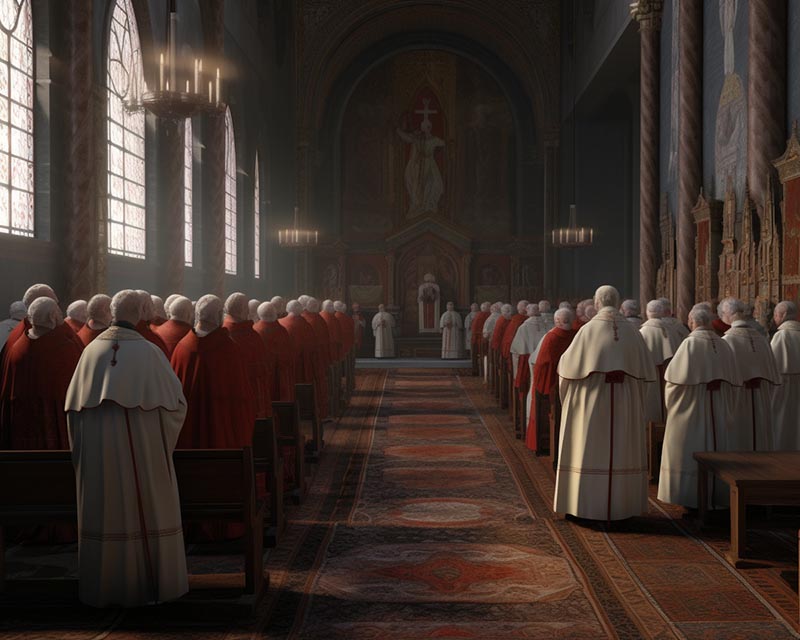
“The new creed defined the Holy Spirit as “the Lord, the Giver of Life, Who proceeds from the Father, With the Father and the Son he is worshiped and glorified.” – https://www.newworldencyclopedia.org/entry/First_Council_of_Constantinople
“In the space of fifteen years he promulgated at least fifteen severe edicts against the heretics, more especially against those who rejected the doctrine of the Trinity.” – Edward Gibbon, “The History of the Decline and Fall of the Roman Empire,” chap 27, par. 11, p1084
“In these edicts it was enacted that any of the heretics who should usurp the title of bishop or presbyter, should suffer the penalty of exile and confiscation of goods, if they attempted either to preach the doctrine or practice the rites of their “accursed” sects. A fine of about twenty thousand dollars was pronounced upon every person who should dare to confer, or receive, or promote, the ordination of a heretic. Any religious meetings of the heretics, whether public or private, whether by day or by night, in city or country, were absolutely prohibited; and if any such meeting was held, the building, or even the ground which should be used for the purpose, was declared confiscated. “The anathemas of the church were fortified by a sort of civil excommunication,” which separated the heretics from their fellow citizens by disqualifying them from holding any public office, trust, or employment. The heretics who made a distinction in the nature of the Son from that of the Father, were declared incapable of either making wills or receiving legacies. The Manichaean [Mani-key-an] heretics were to be punished with death… That these laws might not be vain, the office of “inquisitor of the faith” was instituted, and it was not long before capital punishment was inflicted upon “heresy…” – The Great Empires of Prophecy, from Babylon to the Fall of Rome by AT Jones p555
“The doctrine of the Trinity was not a teaching of the original Christians, who were either with Jesus himself or taught directly by the surviving apostles. This explains why it is not found in the Bible. If it was a fundamental, core doctrine of such great importance, it would have been clearly and unmistakably stated in scripture. The fact that the vast majority of professed Christians and church doctrine today maintain a belief in the Trinity does not prove it is correct. Rather, it suggests that corruption of Christian doctrinal truths is widespread and deep.” – Is Jesus God Almighty? Is the Trinity Scriptural? By Gordon Coulson
“The Babylonian pagan worship of Nimrod, Semiramis, and the god-incarnate son extended throughout the entire world and eventually assumed the name of Trinitarian Christianity.” – The Two Babylons, pp. 240-252
“The pagan trinities had all the prestige of a vast antiquity and universal adoption… The Gentile converts therefore eagerly accepted the Trinity compromise, and the Church baptized it. Now at length we know its origin.”
– John Newton, Origin of Triads and Trinities p27
“The mystery of the trinity is the central doctrine of the Catholic faith.
Upon it are based all the other teachings of the church.”
– Handbook for Today’s Catholic, p. 11
1553 A.D.
Michael Servitus
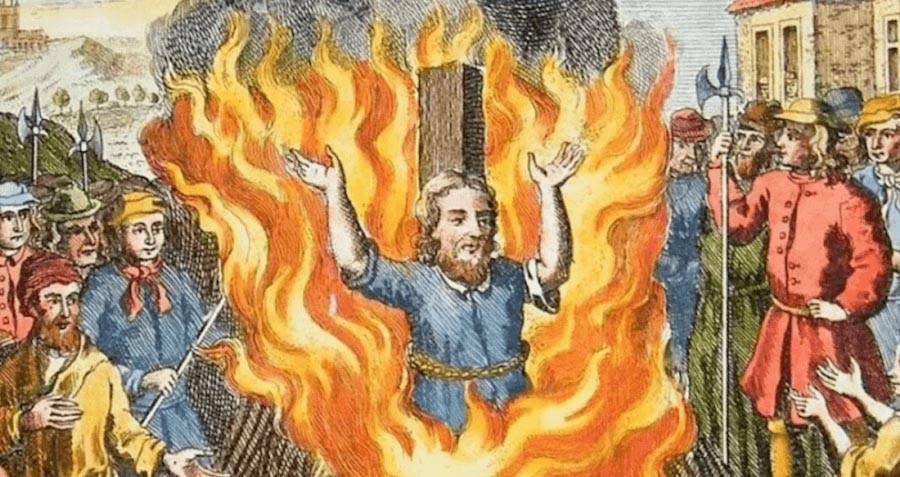
“In his first two books (De trinitatis erroribus, and Dialogues on the Trinity plus the supplementary De Iustitia Regni Christi) Servetus rejected the classical conception of the Trinity, stating that it was not based on the Bible. He argued that it arose from teachings of Greek philosophers, and he advocated a return to the simplicity of the Gospels and the teachings of the early Church Fathers that he believed predated the development of Nicene trinitarianism. Servetus hoped that the dismissal of the trinitarian dogma would make Christianity more appealing to believers in Judaism and Islam, which had preserved the unity of God in their teachings. According to Servetus, trinitarians had turned Christianity into a form of “tritheism”, or belief in three gods... In fact, the council that condemned Servetus was presided over by Ami Perrin (a Libertine) who ultimately on 24 October sentenced Servetus to death by burning for denying the Trinity and infant baptism.[39] Calvin and other ministers asked that he be beheaded instead of burnt, knowing that burning at the stake was the only legal recourse.[40] This plea was refused, and on 27 October, Servetus was burnt alive atop a pyre of his own books at the Plateau of Champel at the edge of Geneva.[41] Historians record his last words as: “Jesus, Son of the Eternal God, have mercy on me.” – Wikipedia
“Every man and woman shall repair in the morning to the divine service and sermons preached upon the Sabbath (Sunday), and in the afternoon to divine service, and catechizing, upon pain for the first fault to lose their provision and the allowance for the whole week following; for the second, to lose the said allowance and also be whipped; and for the third to suffer death.” – Laws, and Orders, Divine, Politique, & Martial For the Colony in Virginia: first established by Sir Thomas Gates, Knight, Lieutenant – General, the 24th of May, 1610
“At eleven o’clock on the 27th of October, Servetus was led from the prison to the gates of the City Hall… The executioner fastens him by iron chains to the stake amidst the fagots, puts a crown of leaves covered with sulphur on his head, and binds his book by his side. The sight of the flaming torch extorts from him a piercing shriek of “misericordias” in his native tongue. [Which is latin for mercy!] The spectators fall back with a shudder. The flames soon reach him and consume his mortal frame in the forty-fourth year of his fitful life. In the last moment he is heard to pray, in smoke and agony, with a loud voice: “Jesus Christ, thou Son of the eternal God, have mercy upon me!” – Schaff, Philip, History of the Christian Church, Vol. III chap 16, p109
1649 A.D.
Maryland Toleration Act
“Long before the First Amendment was adopted, the assembly of the Province of Maryland passed “An Act Concerning Religion,” also called the Maryland Toleration Act of 1649. The act was meant to ensure freedom of religion for Christian settlers of diverse persuasions in the colony. The law made it a crime to blaspheme God, the Holy Trinity, the Virgin Mary, or the early apostles and evangelists. It also forbade one resident from referring to another’s religion in a disparaging way and it provided for honoring the Sabbath [Sunday].” – https://www.mtsu.edu/first-amendment/article/868/maryland-toleration-act-of-1649
“That whatsoever person or persons within this Province and the Islands thereunto belonging shall from henceforth blaspheme God, that is Curse him, or deny our Saviour Jesus Christ to bee the sonne of God, or shall deny the holy Trinity the father sonne and holy Ghost, or the Godhead of any of the said Three persons of the Trinity or the Unity of the Godhead, or shall use or utter any reproachfull Speeches, words or language concerning the said Holy Trinity, or any of the said three persons thereof, shall be punished with death and confiscation or forfeiture of all his or her lands and goods to the Lord Proprietary and his heires.” – Maryland Toleration Act, 1649
Maryland Toleration Act – Archives of Maryland Online (PDF Image)
“And be it further likewise Enacted by the Authority and consent aforesaid That every person and persons within this Province that shall at any time hereafter profane the Sabbath or Lords day called Sunday, by frequent swearing, drunkennes or by any uncivill or disorderly recreation, or by working on that day when absolute necessity doth not require it, shall for every such first offense forfeit two shillings and 6 pence sterling or the value thereof…” – Proceedings and Acts of the General Assembly January 1637/8-September 1664, p245
Massachusetts Law of 1650
In Massachusetts in 1695, anyone found exercising, laboring, conducting business or participating in games, sports or “recreating on the Lord’s day, or any part thereof” could be “put in the cage, or set in the stocks,” for up to three hours. – An Act for the Better Observation and Keeping the Lord’s Day, American State Papers p37-38
“Further bee it enacted that whosoever shall prophane the Lords day by doeing any servill worke or any such like abusses, shall forfeite for every such default tenn shillings or be whipte. PRESUMPTUOUS SUNDAY DESECRATION TO BE PUNISHED BY DEATH.” – An Act for the Better Observation and Keeping the Lord’s Day, American State Papers p36
1705
“If any person whatsoever inhabiting within this Province shall Blaspheme, that is, Curse God, deny our Saviour to be the Son of God, or deny the Holy Trinity, or the Godhead of any of the three Persons, or the Unity of the Godhead, or shall utter any reproachful words or Language concerning the Holy Trinity, or any of the 3 persons thereof, he or she shall for the first Offence be bored through the Tongue, and fined 20 l. Sterling to the King, towards defraying the County charge where the Offence was committed; or if the Party hath not an Estate sufficient to answer that summ, then to suffer 6 months Imprisonment. For the 2d Offence, he or she shall be stigmatized in the Forehead with the Letter B, and fined 40 l. Sterling to the uses aforesaid, or Imprisonment for one whole year. And for the 3d Offence, he or she so offending, and thereof legally convicted, shall suffer Death, with confiscation of all their Goods and Chattels to the King.” – An Abridgement of the Laws in Force and Use in Her Majesty’s Plantations; 1704, Volume 193, p8
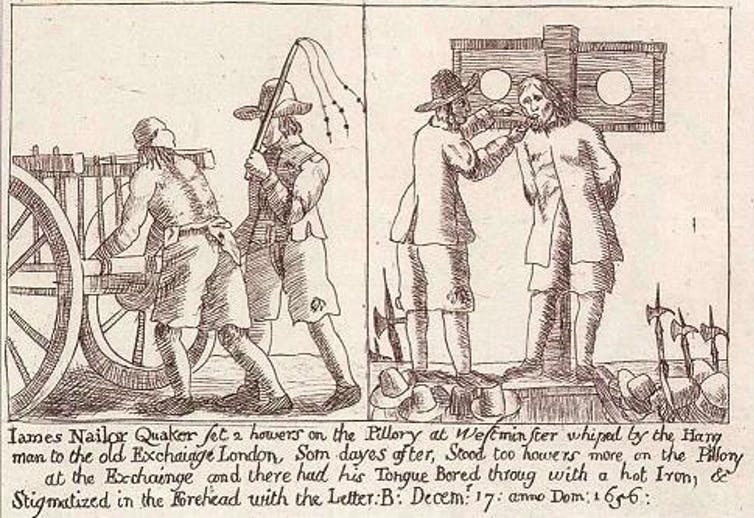
1787 A.D.
The Rise of America
“Written in 1787, ratified in 1788, and in operation since 1789, the United States Constitution is the world’s longest surviving written charter of government. Its first three words – “We The People” – affirm that the government of the United States exists to serve its citizens.”
– ConstitutionCenter.org
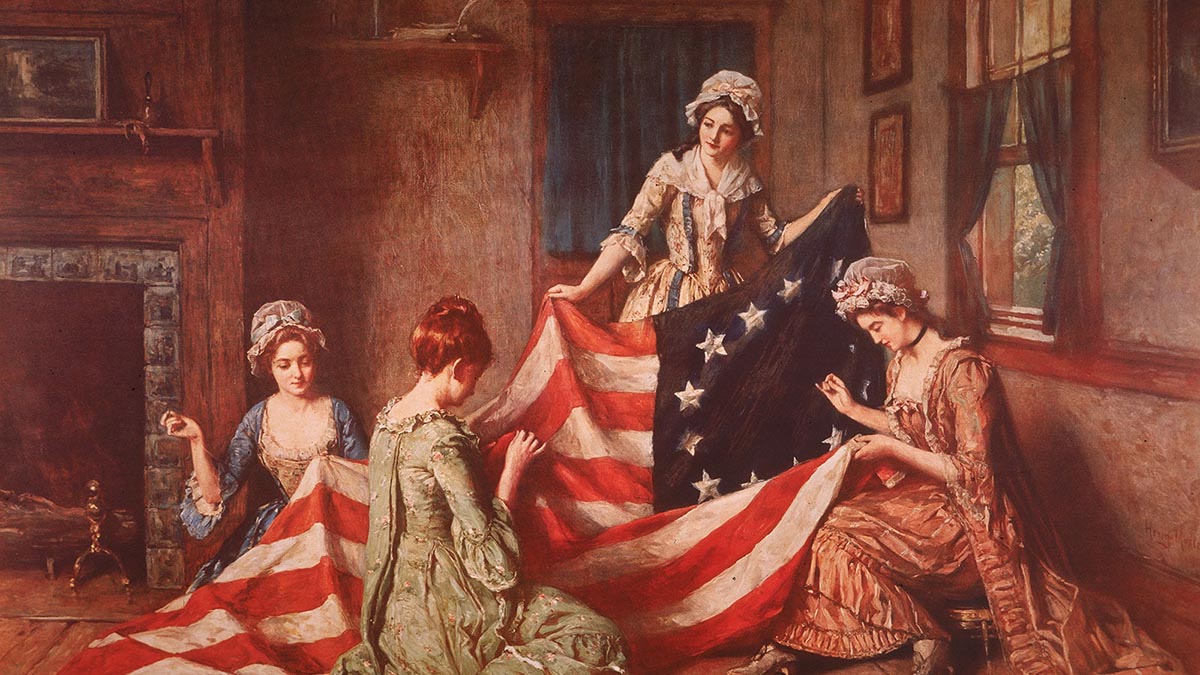
“Congress shall make no law respecting an establishment of religion, or prohibiting the free exercise thereof;
or abridging the freedom of speech, or of the press; or the right of the people peaceably to assemble,
and to petition the Government for a redress of grievances.”
– First Amendment to the Constitution of the United States
“and I beheld another beast coming up out of the earth;
and he had two horns like a lamb, and he spake as a dragon.”
– Revelation 13:11
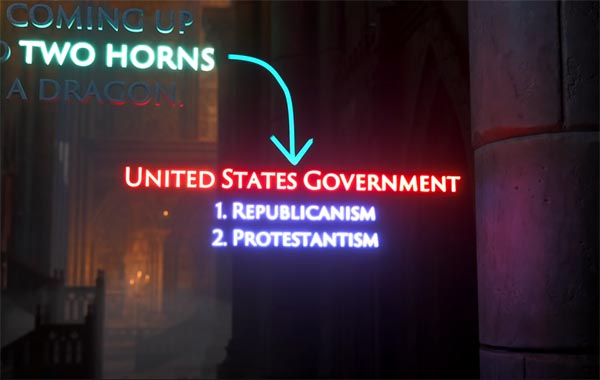
“Believing with you that religion is a matter which lies solely between Man & his God, that he owes account to none other for his faith or his worship, that the legitimate powers of government reach actions only, & not opinions, I contemplate with sovereign reverence that act of the whole American people which declared that their legislature should “make no law respecting an establishment of religion, or prohibiting the free exercise thereof,” thus building a wall of separation between Church & State.” – Thomas Jefferson, Jefferson’s Letter to the Danbury Baptists: The Final Letter, as Sent. The Library of Congress Information Bulletin: June 1998. Lib. of Cong., June 1998. Web. Aug 7, 2010.
“The early colonial laws and documents, especially, contain numerous provisions against heretics, infidels, and dissenting sects. They also abound in recognitions of God, the Trinity, and the like, and provide for the punishment of persons daring to speak or act contrary to the prevalent ideas on the subject of religion…These laws were the result of erroneous ideas brought over by the colonists from the Old World.” – American State Papers Bearing on Sunday Legislation p16, 1911
“The equal rights characteristic of our institutions — is absolutely incompatible with the forfeiture of property because one may refuse to go to church or to observe a day which certain other persons consider sacred ; or with the hanging of Quakers, the lashing of women with bared backs through the streets in midwinter, or with the banishment of such men as Roger Williams — all on account of, exercising their God-given rights in matters of conscience. American principles are the principles that frowned down that religious principles bigotry and intolerance which had held the world captive for ages.” – American State Papers Bearing on Sunday Legislation p16-17, 1911
“When we shall have done away the incomprehensible jargon of the Trinitarian arithmetic, that three are one, and one is three; when we shall have knocked down the artificial scaffolding, reared to mask from view the simple structure of Jesus; when, in short, we shall have unlearned everything which has been taught since his day, and got back to the pure and simple doctrines he inculcated, we shall then be truly and worthily his disciples; and my opinion is that if nothing had ever been added to what flowed purely from his lips, the whole world would at this day have been Christian.” – Thomas Jefferson, Letter to Timothy Pickering, February 27, 1821, “In God We Trust” by Norman Cousins p157
1888 A.D.
The Blair Bill
“But with the introduction of the National Sunday-rest bill by Senator Blair, of New Hampshire, in 1888, the question was again revived, and for a number of years this and other similar measures before Congress were discussed and widely agitated throughout the country.” – American State Papers Bearing on Sunday Legislation p360, 1911 (PDF of the Bill)
“A bill to Secure to the People the Enjoyment of the First Day of the Week, Commonly Known as the Lord’s Day, as a Day of Rest, and to Promote Its Observance as a Day of Religious Worship.” – 50th Congress, 1st Session, Bill S. 2983
After much discussion and debate between Senator Blair and religious liberty advocates A.T. Jones and J.O. Corliss, the bill died, for the reason “the proposed legislation entered the realm of conscience and the field of religious controversy.”
– American State Papers Bearing on Sunday Legislation p361, 1911
1890 A.D.
The Breckinridge Bill
“Sunday is founded, not of scripture, but on tradition. As there is no scripture for the transfer of the day of rest from the last to the first day of the week, Protestants ought to keep their Sabbath on Saturday and thus leave Catholics in full possession of Sunday.” – Catholic Record, September 17, 1893
J.O. Corliss, in arguing against the constitutionality of the Bill, wrote “Taking this to some lawyers, they told us that the old law we had found was still binding. This is a very strict law, and provides that the offender shall pay a fine of 200 pounds of tobacco. But that which makes this law appear so strange, is that it is found in direct connection with another statute which provides that any one who publicly denies the Trinity as commonly held, shall, for the first offense, have his tongue bored through, and for the third offense, suffer death without the benefit of the clergy. Possibly the reason why the promoters of the present Sunday law ignore the one now on the statutes, is because it is in the company of another law so barbarous in its make-up, thus showing the nature of the company Sunday laws of the past have always kept.” – Review and Herald, Jan.21, 1890, Vol.67, No.3, p.44
“But it is this kind of company in which Sunday laws were originally found, and that is where they belong, for they are but a relic of the old system of Church and State. Indeed this law now in force in the District is as near to representing a Church and State power as it could well be.” – Arguments on the Breckinridge Bill p14.5
1900s (20th Century)
20th Century
“Sunday is a Catholic institution and its claim to observance can be defended only on Catholic principles …. From beginning to end of Scripture there is not a single passage that warrants the transfer of weekly public worship from the last day of the week to the first.” – Catholic Press, Sydney, Australia, August, 1900
“In respecting religious liberty and the common good of all, Christians [in the USA and elsewhere] should seek recognition of Sundays and the Church’s holy days as legal holidays.” – Catechism of the Catholic Church, popular and definitive edition, 2000, par. 2188
“The Roman Catholic church “makes its contribution (in the ethical and moral sphere) according to the dispositions of international law, helps to define that law, and makes appeal to it”, that we live in a time when little groups of independent people threaten the unity of the world, and that the only way to combat this problem is by establishing law and then ordering all of society according to this law, thus promoting “peace and good will throughout the earth.” – Apostolic Journey to the United States of America and Visit to the United Nations Organization Headquarters, Meeting with the Members of the General Assembly of the United Nations Organization, Address of Pope Benedict XVI, New York, Friday, April 18, 2008
“…also in the particular circumstances of our own time, Christians will naturally strive to ensure that civil legislation respects their duty to keep Sunday holy.” – John Paul II, Dies Domini
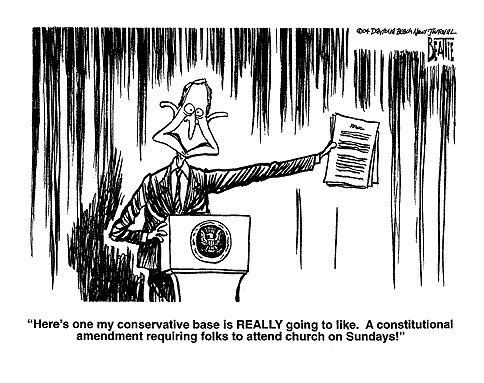
“Protestants . . accept Sunday rather than Saturday as the day for public worship after the Catholic Church made the change . . But the Protestant mind does not seem to realize that in accepting the Bible, in observing the Sunday, they are accepting the authority of the spokesman for the church, the Pope.” – Our Sunday Visitor, February 5, 1950. (Catholic Magazine)
The Mark of the Beast (Near Future)
The Mark of the Beast
“Q. What is Sunday, or the Lord’s Day in general? A. It is a day dedicated by the Apostles to the honour of the most holy Trinity… It is also called Sunday from the old Roman denomination of Dies Solis, the day of the sun, to which it was sacred.” – The Douay Catechism of 1649, p. 143
“The Bible still teaches that Sabbath or Saturday should be kept holy. There is no authority in the New Testament for the substitution of Sunday for Saturday. Surely it is an important matter. It stands there in the Bible as one of the Ten Commandments of God. There is no authority in the Bible for abrogating this commandment, or for transferring its observance to another day of the week. For Catholics there is not the slightest difficulty… we have in the authoritative voice of the Church the voice of Christ Himself. The Church is above the Bible; and this transference of Sabbath observance from Saturday to Sunday is proof positive of that fact.” – The Catholic Record, September 1, 1923 p4
“Let governmental recognition of religion once be established, and there will always be religious organizations ready to take advantage of it, and turn the power and influence of the government to their own ends and aggrandizement. Such has been the history of religion allied with civil government from the remotest ages.” – American State Papers p344
“The doctrine of the Trinity which was established in the church by the council of Nice, A. D. 325. This doctrine destroys the personality of God, and his Son Jesus Christ our Lord. The infamous, measures by which it was forced upon the church which appear upon the pages of ecclesiastical history might well cause every believer in that doctrine to blush.” – Andrews, J. N. (1855). The Three Angels of Revelation 14:6-12. p54
“The doctrine that Jesus Christ the Son of God was God the son was decreed by worldly and ecclesiastical powers. Men were forced to accept it at the point of the sword or else. Thus, the error of the trinity was propounded to the end that ultimately people believed it to be the truth. Thus Christianity became in essence like ‘Babylonian’ heathenism, with only a veneer of Christian names.” – Forgers of the Word, 1983, Victor Paul Wierwille
“What more was ever required by the papacy itself than that “the Christian religion” should be the national religion; that the discipline of the Church should be maintained by the civil power; that the religious test oath should be applied to all; that the public should be taxed for the support of religion and religious worship; that there should be required a belief in the doctrine of the Trinity, and the inspiration of the “Holy Scriptures of the Old and New Testament;” that the guilt of ‘blasphemy’ should be visited upon everyone who should speak or act ‘in contempt of the religion professed by almost the whole community;’ and that everybody should be required by law to observe Sunday? Indeed, what more than this could be required or even desired by the most absolute religious despotism that could be imagined?” – A.T.Jones, Ecclesiastical Empire, pp.837-838
Steven Anderson’s Long Trinity Rant
“These things have I spoken unto you, that ye should not be offended. They shall put you out of the synagogues: yea, the time cometh, that whosoever killeth you will think that he doth God service. And these things will they do unto you, because they have not known the Father, nor me.” (John 16:1-3)
Conclusion
The Death of Christ a Prophecy
For which of the Jewish laws was Jesus condemned to death for breaking?
1. For Claiming to be the Son of God
“The Jews, responding to Pilate, said ”We have a law, and by our law he ought to die, because he made himself the Son of God.” – John 19:7
“The thing that hath been, it is that which shall be; and that which is done is that which shall be done: and there is no new thing under the sun.” – Ecclesiastes 1:9 In the last days, God’s people who keep His commandments and the faith of Jesus (Rev 14:12), will be persecuted for rejecting the doctrine of the Trinity by, 1. believing Jesus is the literal Son of God begotten of the Father (Proverbs 8:22-25; John 1:14; Col 1:15; John 8:42; 1 John 2:22), and 2. for believing the One true God is the Father (1 Cor 8:6, John 17:3), and 3. for their observance of the Sabbath on the Seventh-day in opposition to Sunday laws decreed by men. The records of history and prophecy and the death of Christ all attest that the future of God’s people may be seen in the history of God’s people and even in the death of Christ.
Very soon, in our lifetime, circumstances will be brought upon the world to cause all on earth to decide for or against a plain, Biblical “thus saith the Lord.” These circumstances, the Bible calls the Mark of the Beast, which will be the enforcement of Sunday observance. The observance of Sunday there, will be a sign of our worship and obedience to the Roman Catholic beast and its trinity god, and the observance of the Sabbath on the Seventh-day will attest to our faith and worship of the One True God through His only-begotten Son. As the crisis comes upon us, these circumstances will compel all to decide whom they will obey — and then Jesus will come.

